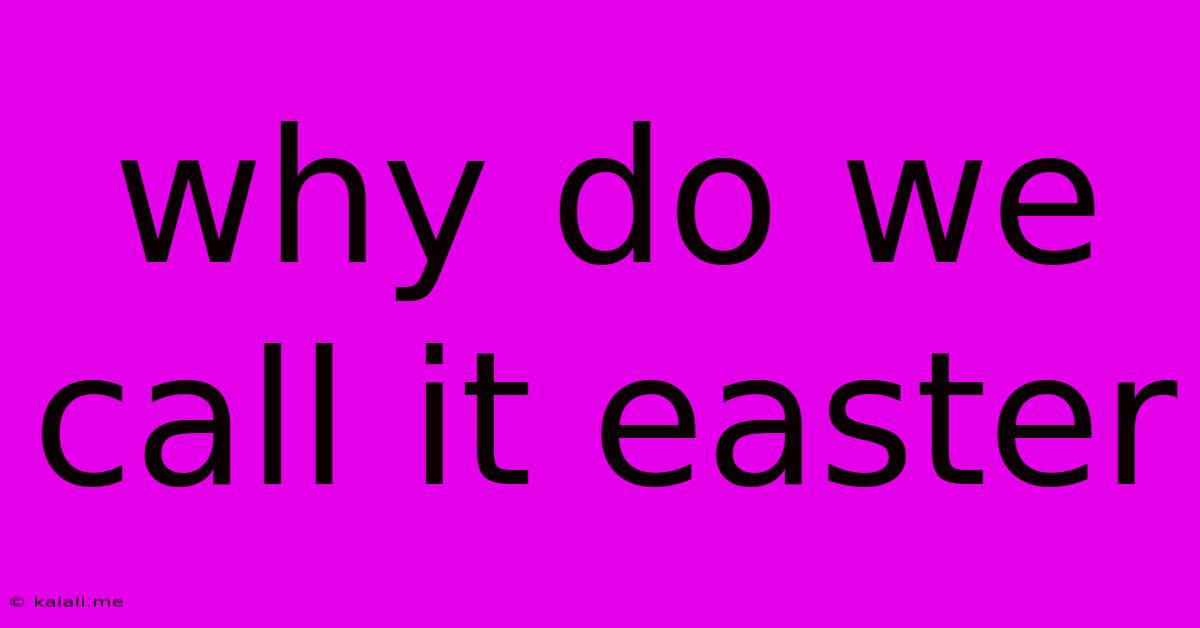Why Do We Call It Easter
Kalali
Jun 04, 2025 · 3 min read

Table of Contents
Why Do We Call It Easter? Unraveling the Name's Ancient Roots
Easter. The name itself conjures images of springtime, chocolate bunnies, and brightly colored eggs. But where did this name, so deeply ingrained in our celebrations, originate? The answer is surprisingly complex, weaving together pagan traditions, Christian adoption, and linguistic evolution. This article delves into the fascinating history behind the name "Easter," exploring its etymology and the various theories surrounding its origins.
The origins of the name "Easter" aren't definitively settled, leading to a fascinating debate among historians and etymologists. Unlike many other Christian holidays with clear biblical connections in their names, the etymology of "Easter" is shrouded in more mystery. Two prominent theories compete for acceptance: the Anglo-Saxon goddess Eostre, and a possible connection to the Hebrew word "Pesach" (Passover).
The Eostre Theory: A Pagan Goddess's Legacy?
The most widely accepted theory links "Easter" to the Anglo-Saxon goddess of spring, Eostre (or Ostara). Evidence for this connection comes from the writings of the Venerable Bede, a respected 8th-century scholar. Bede mentioned Eostre in his influential work, De temporum ratione, associating her with the spring equinox and the arrival of new life. This association suggests that the name "Easter" may be a direct descendant of this pre-Christian deity's name, reflecting the Christian church's adoption and adaptation of existing pagan festivals. This process of Christianization involved subtly overlaying Christian meaning onto existing celebrations, a common practice throughout history.
This theory gains credence from the fact that many spring festivals celebrated in pre-Christian Europe were associated with themes of rebirth and fertility, aligning well with the Christian message of resurrection. The incorporation of pagan traditions into the Christian calendar aimed to facilitate smoother conversions and avoid unnecessary cultural upheaval.
The Passover Connection: A Less Accepted Interpretation
A less prevalent theory suggests a connection between "Easter" and the Hebrew word "Pesach," meaning Passover. This theory proposes a possible linguistic evolution, arguing that a corruption or alteration of "Pesach" over time might have led to "Easter." However, this theory lacks the strong linguistic and historical evidence supporting the Eostre connection. The phonetic shift would be significant and difficult to trace conclusively.
Furthermore, the existing evidence points more strongly towards the influence of Germanic traditions in the naming of the holiday, rather than a direct linguistic borrowing from Hebrew. The widespread use of the name "Easter" in various Germanic languages further strengthens the Eostre theory.
The Linguistic Evolution: From Eostre to Easter
Regardless of its ultimate origin, the name "Easter" has undergone a fascinating linguistic evolution. The transition from the original Anglo-Saxon form "Eostre" to the modern "Easter" reflects the natural shifts in language over centuries. The change reflects the evolution of English itself, moving through various dialects and influenced by external factors. This linguistic evolution mirrors the broader cultural evolution, reflecting the intertwining of pagan and Christian traditions in the celebration of Easter.
Conclusion: A Blending of Cultures and Beliefs
The name "Easter" remains a testament to the complex interplay between pagan beliefs and Christian adoption. While the precise origin remains a subject of scholarly debate, the evidence strongly suggests a link to the Anglo-Saxon goddess Eostre, reflecting the assimilation of pre-Christian traditions into the Christian calendar. Understanding the etymology of "Easter" allows us to appreciate the rich historical context and cultural layering that contribute to the unique character of this global celebration. The name, like the holiday itself, is a beautiful blend of ancient traditions and modern celebrations.
Latest Posts
Latest Posts
-
Absorption Spectra In Films Chemicals And Dyes
Jun 06, 2025
-
Should I Back Up On Battery Power Mac
Jun 06, 2025
-
Connect Sposervice No Valid Oauth 2 0 Authentication Session Exists
Jun 06, 2025
-
Is There Work Done By The Lorentz Force
Jun 06, 2025
-
Standard Height Closet Shelf And Rod
Jun 06, 2025
Related Post
Thank you for visiting our website which covers about Why Do We Call It Easter . We hope the information provided has been useful to you. Feel free to contact us if you have any questions or need further assistance. See you next time and don't miss to bookmark.